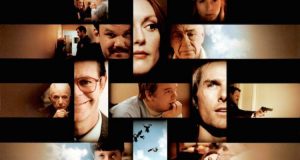
BY ŞEBNEM TÜRE (PSYC/II) sebnem.ture@ug.bilkent.edu.tr
A father who was slightly obsessed with the performance of his son, a child prodigy, on a quiz show was awakened in the middle of the night. The child, standing in front of him in the dim light, wrapped in a blanket, told his father that he needed to be nicer to him. Following an awkward silence, the child asked again. And the father said, “Go to bed.”
Somewhere else, a grandma was having a very serious talk with her daughter and son-in-law. “If you don’t let that kid pursue what she wants in life,” she said, “she’ll blame you for the rest of her life, for every single misery.”
Around the same time, someone didn’t attend her nephew’s wedding ceremony because she was too proud to talk to her sister again. She was heartbroken, offended by that simple but yet weirdly complicated conversation that she had had with her sister, and although she loved her nephew, she didn’t attend the ceremony. People gossiped at the wedding that day. A family relationship that had seen lots of dinners and birthdays together was officially broken.
Not so far away, a 17-year-old was crying in the corner. He didn’t want to lie, yet he couldn’t help it, as sometimes we create more harm when we try to make up for our mistakes. That day, he didn’t realize how young he was – and how at some point, he would actually get used to being in the position of messing things up sometimes. Meanwhile, an old man was feeling guilty too. He put on the Travis song “Why Does It Always Rain on Me?” in the background. “Is it because I lied when I was seventeen?” the band asks.

In front of the international departures gate at the Sofia airport, another man was waiting. He had been there for hours now, carrying two beautiful teddy bears. Each of his grandchildren was going to get one. He hadn’t been able to see them for quite a while. His daughter wasn’t talking to him, and he knew that she had some right not to.
“I don’t know where he learned that I was going to move away from the city now. After seeing the way the kids were running toward him, you know, I felt a surprising relief. At that point, he looked like a good father, with only some good memories in my head. I don’t know if I can say that I forgive him, but I felt the relief.”
I saw that old man today in the building where I live. Well, he was almost the same man.
That little boy needing more attention, the concerned parents of that girl who wants to start a very “risky” career, those relatives who don’t talk to each other anymore, that 17-year-old feeling guilty – I’m almost sure that I’ve met them all at some place and time. Maybe some of them are familiar to you too.
The 1999 Golden Bear–winning movie “Magnolia,” directed by Paul Thomas Anderson, brings together these similar stories of lives that are filled with incongruity, mistakes and regret. It’s a plot full of things that didn’t go quite right – a three-hour-long story of people who were not at their best as human beings, and who were not alone in this.
A scene in the movie refers to a verse in the Bible, Exodus 8:2, which tells of a message from God given to the pharaoh of Egypt through Moses. It says that if the pharaoh doesn’t release the people God wants him to set free, he will be punished by a plague of frogs: “And if thou refuse to let them go, behold, I will smite your whole territory with frogs.”
The target of the threat was the pharaoh, but all of his people were going to pay the price along with him. This is an allegory that hits home, reminding us that our actions can be very costly and can weirdly affect so many others around us. So, sometimes we need to be reminded by “the frogs.”
But do we also put an end to this situation? Do we let our regrets go at some point and feel, or give, relief? Or do we continue to live in that state of being the unforgiven or, sometimes, the unforgiving? The allegory reminds us that our human shame, fears and sins are held obstinately within us. And so as long as we “refuse to let them go,” the frogs keep falling down.
It’s not always logical to take and carry all the blame on our own shoulders – or, conversely, to lay it all at someone else’s door. Being too proud to forgive. Being vulnerable, but trying to look strong. It’s not working, yet so many of us are living like this. Look around… you’ll see.
And by ending with words from the film’s trailer, I’ll try to echo the humane tone of its message:
Things fall down.
People look up.
And when it rains, it pours.
